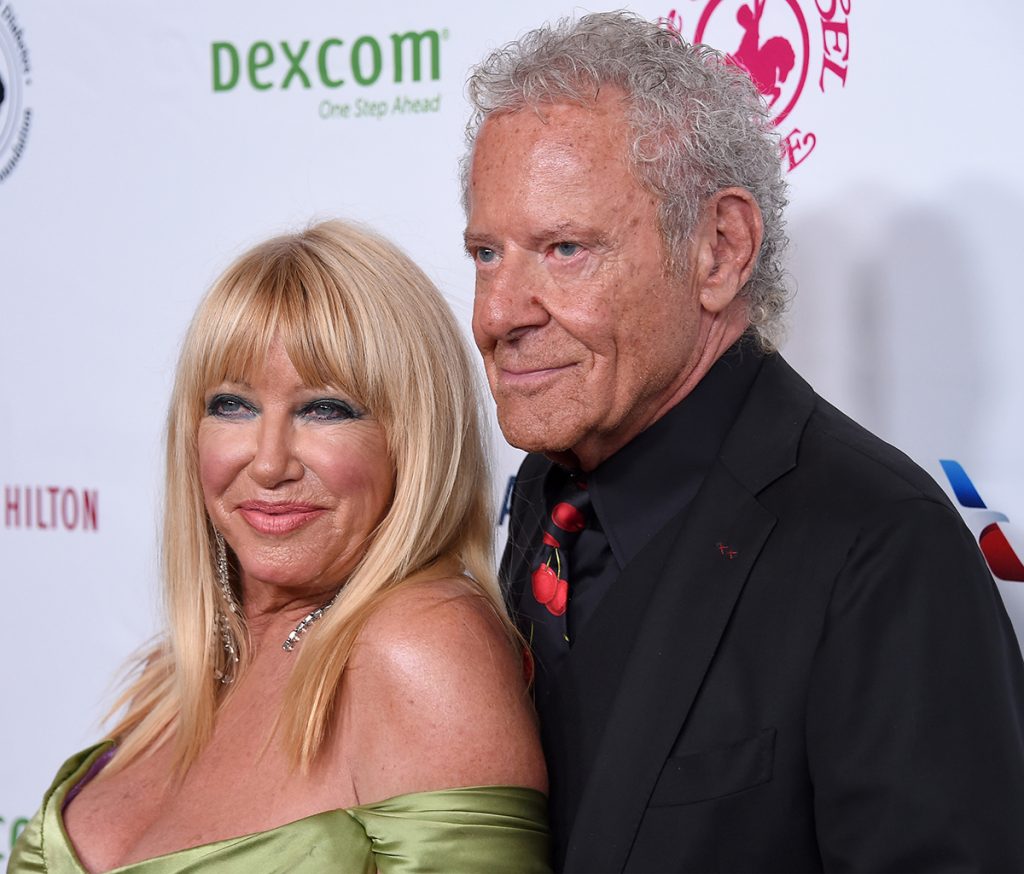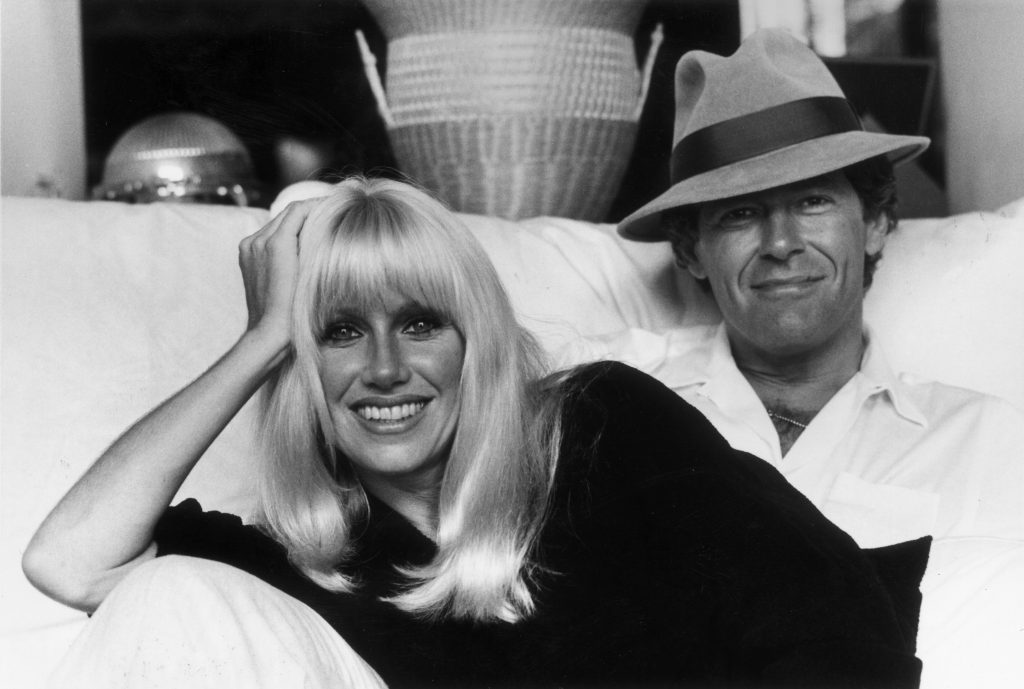Coping With The Loss of a Loved One
- Late actress Suzanne Somers lost her battle to breast cancer one year ago—and her widower and Canadian producer Alan Hamel, 88, has insisted “half of me is her” as he continues coping with the loss of his beloved.
- Somers passed away at age 76 on October 15, 2023. She battled skin cancer in her 30s, and later in her 50s, she was diagnosed with breast cancer.
- Experts warn that women should absolutely, under no circumstance, ever substitute approved treatments backed by data and, or FDA registered clinical trials, for alternative, unproven treatments, and that doing so is extremely dangerous.
- Grief is a difficult, truly personal process, something Hamel has certainly shown. Some find solace in vulnerability and sharing how they feel with others. While working through grief and vulnerable tackling of the emotions that accompany it, some find tools like therapy to be helpful. Support groups can also be a benefit for those who are feeling isolated in their feelings of grief. Faith can also be a powerful coping mechanism for some.
- Whichever methods of support you look for after cancer loss, you should know that there is no correct way to grieve. There is no perfect timeline for grieving, either.
In honor of his late wife, who passed away at age 76 on October 15, 2023, the 88-year-old Canadian producer told DailyMail.com, “Missing Suzanne is probably not a powerful enough word because for the past 55 years we didn’t even spend one hour apart, it’s heartbreaking.
Read MoreView this post on Instagram
As for how he’s been doing without her by his side, he told the news outlet, “Now for the first time in 55 years I’m alone; I have not lived alone much in my life – the only time was for two weeks and I hated it. I was very young and I just didn’t like it.”
However, he thankfully has “photos everyone” in his home which he says “helps” him cope with her loss.
He explained, “In the early years, Suzanne and I were putting our two families together. Those of you who have done this know how difficult an assignment that is.
“But Suzanne declared that she would put our two families together and create one magnificent family and that she did.”
Expert Resources On Coping With Loss
- Mental Health and Cancer — The Fight, Flight or Freeze Response
- Mental Health: Understanding the Three Wellsprings of Vitality
- Dealing With Grief Related to Health Problems
- How to Handle the Emotional Toll of Caring for a Loved One With Cancer: Prioritizing Your Mental Health
- How to Be Realistically Optimistic: Coping With Mental Health Long-Term
Hamel continued, “And six beautiful grandkids iced the cake. Both of us loved our children dearly. During the years she was doing television, we rarely accepted invitations to industry events and just wanted to be at home together.
‘We had a beach house in Venice and every Sunday the kitchen island was loaded with incredible food that Suzanne had made and we also invited our cherished friends to join us for the afternoon, eat great food and hang out on the beach. Life was good courtesy of Super Mom and Super Wife.”

He concluded, “Suzanne did what she came to do. Suzanne said ‘when you’re in the next room I miss you’ Wow!!! Wow!!! Wow!!! Those could have been my words. One day…. Together again.”
Meanwhile, in the wake of Somers’ death and on what would have been her 77th birthday day last year [Oct. 16. 2023], Hamel paid tribute to his late wife saying with an emotional Instagram post.
Writing in all caps, alongside two sweet photos of the both of them, he said, “55 YEARS TOGETHER, 46 MARRIED AND NOT EVEN ONE HOUR APART FOR 42 OF THOSE YEARS.
“EVEN THAT DOESN’T DO IT. EVEN GOING TO BED AT 6 O’CLOCK AND HOLDING HANDS WHILE WE SLEEP DOESN’T DO IT. STARING AT YOUR BEAUTIFUL FACE WHILE YOU SLEEP DOESN’T DO IT.”
He added, “I’M BACK TO FEELINGS. THERE ARE NO WORDS. THERE ARE NO ACTIONS. NO PROMISES. NO DECLARATIONS.
“WE ARE ONE. I AM IN LOVE WITH YOU, MY BEAUTIFUL SUZANNE, FOR ALL OF ETERNITY. ALAN.”

Suzanne Somer’s Cancer Battles
Somers fought skin cancer in her 30s, and twenty years later in her 50s, she was diagnosed with breast cancer.
She previously told CBS News during an interview, “Even when I was Chrissy on ‘Three’s Company,’ I had cancer three times. They call it severe hyperplasia in your uterus. I didn’t make a big deal about it. In my 30s, I got a malignant melanoma in my back.”
Melanoma is a type of skin cancer that starts in the same cells that give your skin, hair, and eyes their color. Only, in melanoma, the cells change in a way that makes them able to spread to other organs.
It’s known that her breast cancer was stage 2, so it was caught relatively early, and since then, she has bravely shared her battle with her fans, and also sparking some controversy in regard to her treatment decisions. Experts warn that women should absolutely, under no circumstance, ever substitute approved treatments backed by data and, or FDA registered clinical trials, for alternative, unproven treatments, and that doing so is extremely dangerous.
RELATED: Risk Factors for Breast Cancer
Dr. Sarah Cate Explains the Difference Between Lumpectomy & Mastectomy
“What I wanted to do was less controversial than implants,” Somers told SurvivorNet in a previous interview. “I was restoring my breast exactly as it was prior to the surgery.”
In Somer’s opinion, the treatment route a person takes is their own choice. But as SurvivorNet’s experts often warn, alternative medicine is never a replacement for traditional medicine that’s backed by science. And Somers has said that treatment is a personal decision that should be discussed with a doctor.
Following Somers’ passing, People confirmed the actress died at 5:30 a.m. on Sunday, Oct. 15, 2023, after breast cancer spread throughout her body.
A death certificate obtained by The Blast revealed Somers’ breast cancer had metastasized to her brain. Somers’ death certificate also noted some underlying conditions that led to her death, as high blood pressure and hydrocephalus, the buildup of fluid in the brain’s ventricles.
Understanding What’s Valid Health Information Online
Knowing that Somers used alternative therapy to combat her breast cancer, it’s important to note that patients who rely on unproven methods outside of the conventional medical realm often end up with fatal consequences; a study released by researchers at Yale University in 2017 revealed that patients with cancer who only use alternative treatments are twice as likely to die from the disease.
How can you know whether the information you read online, especially medical information, is reliable? There are a few ways:
The National Institutes of Health recommends that, as a rule, the sites you get medical information from should be sponsored by federal government agencies. Knowing who or what sponsors and hosts the website you’re reading from is important, too.
- .gov are government agencies
- .edu identifies an educational institution
- .org usually identifies nonprofit organizations
- .com identifies commercial website
Dr. Jason Westin, leader of the diffuse large B-cell lymphoma research team at MD Anderson Cancer Center in the Department of Lymphoma and Myeloma, told SurvivorNet in an earlier interview: “Make sure if you’re finding information on the internet about something that sounds too good to be true, talk to your doctor about it.”
Alternative Therapies: Don’t Believe Everything You Read on the Internet
“Alternative therapies” refer to treatments that people may choose in place of conventional, scientifically backed medicine. These alternative methods can range from mind-body approaches and diet and nutrition choices to supplements, healing crystals, Chinese medicine and Ayurvedic medicine. They’re touted all over the internet, and they often sound too good to be true. And that’e because they probably are, Dr. Westin says.
It’s for a beneficial reason that these therapies aren’t used at comprehensive cancer centers: they haven’t proven themselves effective in clinical trials – rigorous studies that test treatments in the population of people they’re intended to treat. Clinical trials test new treatments for safety and efficacy; every drug or treatment approved for widespread use by the U.S. Food and Drug Administration has to have gone through multiple phases of clinical trials.
It’s also important to note that the validity of scientific data is determined by whether results can be repeated by other researchers, the sample size of the study and the academic credentials of the researchers and journal where the information is published.
Sometimes, the therapies or supplements you read about on the internet can be OK, and maybe even beneficial, if they’re used with conventional medicine, not in its place. These options make up “complementary medicine,” which, when used in tandem with conventional medicine, is called “integrative medicine.”
The Difference Between Integrative Medicine and Alternative Medicine
Many doctors believe in integrative medicine, so long as they remain in the loop and give their patients the go-ahead before combining anything new with their treatment. But the majority of doctors tend to be in agreement about the fact that these options should never replace conventional treatment.
Even if you aren’t planning on foregoing the treatment that your doctor prescribes as you try out something you read online, it’s absolutely vital that you talk to your doctor first. They are the only ones who will be able to tell you whether that “cancer-curing” supplement is going to interact negatively with your actual treatment. It may, for instance, cause the treatment to be less effective. Or it may wind up being harmful, or cause debilitating side effects.
How Support Makes a Difference
In the aftermath of Alan Hamel’s wife’s death, the 88-year-old Canadian entertainer isn’t shy to speak about how much he misses Suzanne Somers.
Whether you’re in the midst of a cancer battle, fulfilling the duties of being a caretaker or coping with the loss of a loved one, it’s important that everyone involved in a cancer journey gets the support they need.
RELATED: The Toughest Conversations: Losing a Spouse to Cancer
Support groups, or connecting with just one other person, can make a major difference in helping someone feel less alone during a tough time. Even religious support, like the Buddhist faith, something can help with the feelings that come with loss.
Doug Wendt, Who Lost His Wife To Ovarian Cancer, Shares How He Coped With Her Passing
Making connections with those who have gone through shared experiences can really make an impact on how you cope as well as move forward with your life. In the case of Doug Wendt, who lost his wife Alice to ovarian cancer, he learned an important lesson in the difference between “moving on” and “moving forward” after losing a spouse to cancer.
“We’re never gonna move on, I don’t even think I want to move on, but I do want to move forward,” Doug told SurvivorNet in an earlier interview.
The Toughest Conversations: Losing a Spouse to Cancer
“That’s an important distinction and I encourage anybody who goes through this journey as a caregiver and then has to face loss, to think very carefully about how to move forward.”
Contributing: SurvivorNet Staff
Learn more about SurvivorNet's rigorous medical review process.

